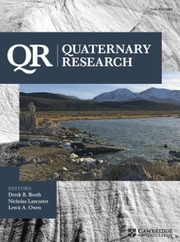Article contents
Estimating the regional climate signal in a late Pleistocene and early Holocene lake-sediment δ18O record from Vermont, USA.
Published online by Cambridge University Press: 20 January 2017
Abstract
We present a new oxygen isotope (δ18O) record from carbonate-rich lake sediments from central Vermont. The record from Twin Ponds spans from 13.5 cal ka BP (1950 AD) to present, but contains a 6 ka long hiatus starting shortly after 7.5 cal ka BP. We compare the record for ca. 13.5–7.5 cal ka BP with published δ18O data from the region after using a Bayesian approach to produce many possible chronologies for each site. Principal component analysis then identified chronologically-robust, multi-site oxygen isotope signals, including negative values during the Younger Dryas, but no significant deviations from the early Holocene mean of the regional records. However, differences among sites indicate significant trends that likely relate to interacting changes in the regional gradients of seasonal temperatures and precipitation as well as moisture sources, moisture pathways, and aridity that were controlled by large-scale climatic controls such as insolation, the progressive decline of the Laurentide Ice Sheet, and changes in oceanic circulation. Centennial shifts punctuate these trends at ca. 9.3 and 8.2 cal ka BP, and reveal that the local character of these short-lived features requires a detailed understanding of lake hydrology and regional isotopic gradients to yield reliable information for regional climate reconstructions.
- Type
- Research Article
- Information
- Copyright
- Copyright © American Quaternary Association 2016
References
- 8
- Cited by


